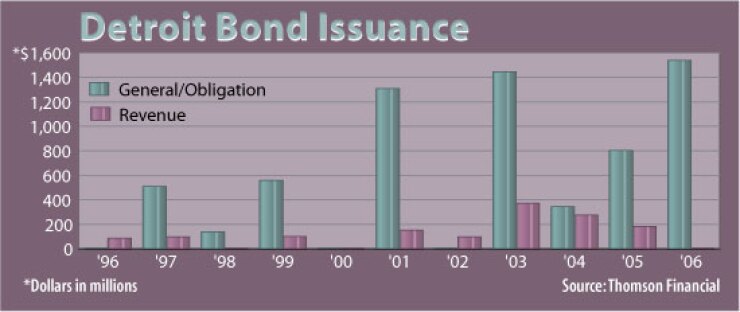

CHICAGO - After being snubbed by the Detroit City Council, Mayor Kwame Kilpatrick yesterday held an impromptu news conference to deliver a "bare-bones" $3 billion fiscal 2009 budget that includes no new spending and is balanced with revenue expected from two major proposals that were shelved by the council last year.
The mayor's $3.04 billion budget for the coming fiscal year calls for hiring 46 new employees, including 14 for the city's understaffed finance department, which officials have said is partly to blame a chronic lateness in releasing annual audits.
The budget assumes a 2.1% increase in real estate tax revenue, a slight decline in income tax revenue, and $85 million that would be generated by a long-stalled deal to lease the Detroit-Windsor Tunnel, as well as the sale of several city-owned real estate parcels.
The budget also includes two final debt service payments, including a final $50 million payment on 20-year-old revenue bonds and a $40 million balloon payment on five-year-old budget stabilization bonds.
As Kilpatrick arrived yesterday morning at City Hall to introduce the budget, the council handed him a dramatic rebuke by refusing to hear the address, instead adjourning the meeting. The move illustrated the deteriorating relationship between the council and the mayor, who faces eight felony counts ranging from perjury to misconduct in office stemming from testimony in a whistleblower trial last year.
Council President Ken Cockrel - who would take over as mayor if Kilpatrick is forced to resign - said yesterday that the council would go ahead with budget hearings over the next several months. Detroit's fiscal year begins June 1.
Kilpatrick's $3.04 billion budget includes a $1.39 billion general fund, $56.7 million for capital projects, and $77 million for ongoing debt service - a decrease of $44.9 million from last year. The budget also includes the proposed sale of $52 million in general obligation bonds, as part of an overall $68.4 million in capital improvement recommendations.
"For several years as we developed our budget, we were frankly just holding on," Kilpatrick said. "Structurally, our budget is in the best shape since we started working together six years ago."
Detroit ended fiscal 2007 with a $159.9 million deficit, according to an estimate from City Council fiscal analyst Irvin Corley Jr. That includes at least part of an $88 million deficit left over from 2006.
Kilpatrick last year proposed eliminating that deficit in part through leasing Detroit's portion of the Detroit-Windsor Tunnel to a private company. The plan fell apart during budget hearings when the council said it did not have enough details to approve the lease.
Kilpatrick has revived the lease plan this year as a key to eliminating the current fiscal deficit - and this time the council is likely to approve it, according to sources. The lease would raise $65 million in one-time revenue for the city, Kilpatrick said yesterday. An additional $19 million in one-time revenue would come from the sale of various city-owned real estate parcels - a plan that was also proposed and rejected by the council last year.
The fiscal 2009 budget contains no funds for solid waste disposal - for the first time in the city's history, according to Kilpatrick - largely because the city this year will make its final $50 million debt service payment on 20-year old revenue bonds issued to build the Greater Detroit Resource Recovery Plant.
"The fiscal prudence and discipline we have shown over the past six years has enabled us to make the final payment this year," Kilpatrick said. "We were told several times during our most difficult financial periods that we should refinance the debt and push it our further, rather than sticking to the 20-year repayment schedule. We didn't do that. The fact that we didn't is one of the reasons Standard & Poor's and others are looking to us now to give us upgrades."
Late last year, Standard & Poor's revised its outlook to stable from negative on the city's unlimited and limited general obligation bonds, rated BBB and BBB-minus respectively.
The city also this year will make its final $40 million balloon payment on $65 million in budget stabilization bonds issued in 2004.
The mayor's spending plan comes as he continues to push a $330 million casino tax-backed revenue bond sale that is his chief economic stimulus plan for the city. After outlining his budget goals to the press yesterday, Kilpatrick urged the council to review and approve the bond plan, which he said was critical to the "city's most pressing capital needs."
Last week, Cockrel and other council members openly ridiculed the bond plan, calling it a "30-year mortgage we can't afford to pay."
The council last week began a series of hearings into why it never learned of flirty text messages that are at the center of the criminal allegations surrounding Kilpatrick and his former chief of staff Christine Beatty.
Meanwhile, the city won rare praise from ratings analysts yesterday as Standard & Poor's upgraded its underlying rating on Detroit's outstanding senior-lien water support system bonds to A-plus from A, as well as its long-term rating on its second-lien water support system bonds to A from A-minus. Analysts cited the system's financial performance and strong management in the upgrade.
The upgrade comes as the city prepares to enter the market next week to refinance roughly $390 million in water and sewer bonds from variable-rate to fixed-rate.
Kilpatrick and Beatty face a total of 12 felony counts accusing them of lying under oath about the nature of their relationship and about the firing of a Detroit deputy police chief, one of three police officers who accused the city of firing them in retaliation for investigating the mayor.





